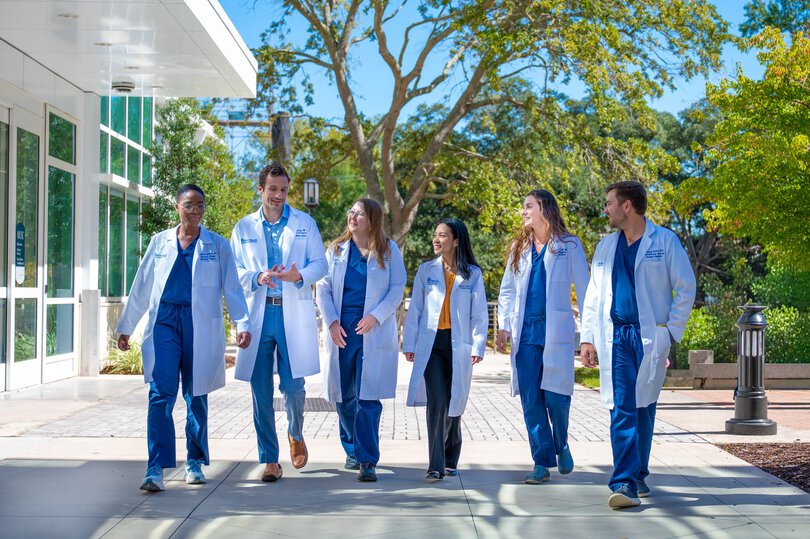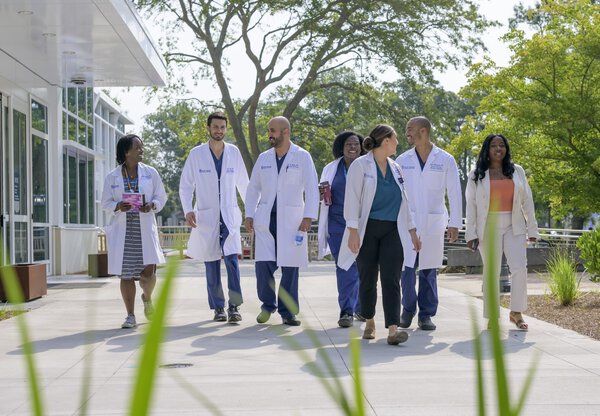A Year in Review
The Year in Review highlights key accomplishments in the MUSC Department of Surgery

Over the past decade, the MUSC Department of Surgery has grown not only in size and scope, but in spirit. What began as a vision to strengthen our programs and expand access to high-quality surgical care has evolved into a new era of growth—one defined by innovation, teamwork, and a culture that empowers every member of our community to lead with purpose.
Building on the strong foundations established by leaders before us, we have continued to advance the Department of Surgery’s mission through collaboration and shared commitment. Our progress has been powered by people: the dedicated faculty, staff, and trainees who strive daily to deliver compassionate, world-class care; the grateful patients and families whose generosity fuels discovery and education, and the partners and donors who share our belief that surgical innovation can transform lives across South Carolina and beyond.
Together, we have redefined what collaboration looks like in academic medicine—bridging disciplines, embracing new technologies, and investing in education that prepares the next generation of surgeon-scientists. The Harvey and Marcia Schiller Surgical Innovation Center, increased investments in research and implementation science, the statewide Surgical Quality Collaborative, and new initiatives such as dedicated research tracks across all residency programs, an advanced surgical simulation center, and expanded training pathways all reflect this shared commitment to continuous improvement and impact.
Perhaps the most meaningful transformation, however, has been cultural. We are a department that values curiosity as much as technical skill, inclusion as much as excellence, and teamwork as much as leadership. This culture—built on trust, mentorship, and gratitude—has become our greatest strength.
As we look ahead, our mission remains clear: to advance surgical care through innovation, education, and collaboration,while honoring the patients and partners who make this journey possible. With their continued support, and the passion of our extraordinary teams, the future of surgery at MUSC has never been brighter.
With deep gratitude,
- Prabhakar Baliga, M.D., Department Chair
Read the latest Department of Surgery Annual Report (PDF).

The Year in Review highlights key accomplishments in the MUSC Department of Surgery
MUSC Department of Surgery 2025 Annual Report

A Decade of Transformational Leadership in the Department of Surgery

MUSC Surgery Sessions honors the remarkable faculty and alumni whose expertise, passion,and innovation have shaped the MUSC Department of Surgery.

In FY25, several clinical multidisciplinary teams and programs were recognized for improving patient care locally, regionally, and nationally.

Through several initiatives, the Department of Surgery aspires to create a culture where all team members are valued.

Our faculty are at the leading edge of surgical innovation and clinical care.

This year has been one of remarkable growth and continued excellence in surgical education.

The MUSC Global Surgery Program has grown into one of the most dynamic global surgery programs in the country.

The Harvey and Marcia Schiller Surgical Innovation Center houses expertise in AI, HCD and Outcomes Research

Learn more about the recent advances in basic, translational and outcomes research.
Our commitment to providing the highest level of compassionate patient care, best–in–class training for the next generation of surgical leaders, and cutting-edge clinical, basic science and translational research are Changing What's Possible for our patients.
1,887 general surgery, 143 vascular surgery, 330 plastic surgery, 167 cardiothoracic surgery
Your gift to surgery will help save lives, advance innovation and educate the next generation of surgical leaders.